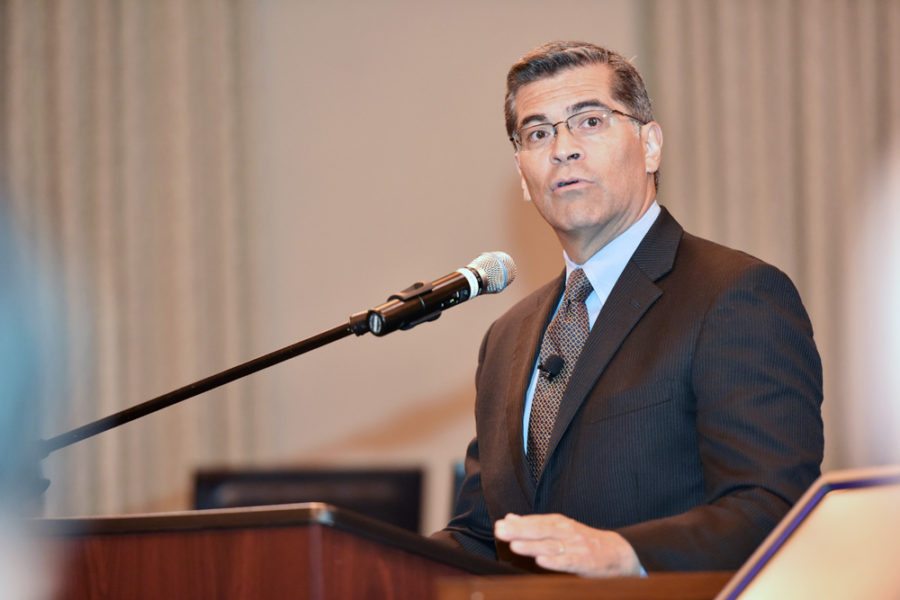 View Winners →
View Winners → Attorney General Opinion on Pasadena Elections Indicted as ‘Fatally Flawed’


Attorney General Xavier Bacerra – Photo by Terry Miller / Beacon Media News
A 36-page Counter-Opinion Wednesday described Attorney General Xavier Bacerra’s July 11 opinion that the City of Pasadena and the Pasadena Unified School District must switch to even year municipal elections as “fatally-flawed.” The Counter-Opinion by civil right attorneys Skip Hickambottom and Dale Gronemeier asserts:
“Pasadena’s plenary power to determine the timing of its local election is restricted only by the Pasadena Charter provisions requiring that its exercise must be consistent with the Charter and with the California Constitution; its plenary authority over the timing of its local election is not restricted by inconsistent general State law.”
On July 11, the Office of the California Attorney General issued AG Opinion #16-603 concluding that “[t]he California Voter Participation Rights Act [CVPRA] applies to charter cities, and to local school districts,” and that Pasadena and PUSD have to shift from local-only odd year elections to even year elections that would be held concurrently with State and federal elections.
The Hickambottom-Gronemeier Counter-Opinion analyzed more than 30 California Supreme Court and Court of Appeal cases from 1880-2014 that were related to charter cities constitutional “home rule” over local elections; the counter-opinion concluded that “California courts will reject [the Attorney General’s] conclusion that the CVPRA trumps Pasadena’s charter provisions which set ‘the time at which’ local elections are held and will instead recognize Pasadena’s and PUSD’s State Constitution “plenary authority” to determine local election timing.”
Many California cities and school districts are “general law” entities, but a minority, including the City of Pasadena and PUSD are “charter” entities because both are established by the charter of the City of Pasadena. The California Constitution Article XI, §5a, gives charter cities the right to legislate “in respect to municipal affairs” over inconsistent state law. The Constitution’s Article XI, §5b(4), provides that the charters of such cities give them “plenary authority… to provide therein … the manner in which, the method by which, the times at which, and the terms for which the several municipal officers and employees whose compensation is paid by the city shall be elected or appointed…” The California Constitution Article IX, §16(a), establishes that a city charter may regulate school board elections. These constitutional provisions providing charter entities greater rights than general law entities are commonly referred to as “home rule” rights.
Pasadena’s Charter provides for election of the Mayor, Councilmembers, and PUSD Board members in primary elections in March of odd-numbered years and run-offs six weeks later. The AG Opinion maintains that Pasadena has to change its elections to even years, relying primarily on Jauregui v. Lawndale, a 2014 Court of Appeal decision that held Lawndale’s at-large election system was impermissible because it diluted of the voting strength of racial minorities.
The Counter-Opinion contends that the AG Opinion’s reliance on the Lawndale case is a “critical flaw” because the AG fails “to analyze the decisive role of other State constitutional guarantees where they come into play – which results in AG Opinion #16-603 failing to meaningfully address the difference between constitutional-based challenges and non constitutional challenges to home rule rights and its making a false equivalency between the [California Voting Rights Act’s, the statute involved in the Lawndale case] implementation of constitutional guarantees and the CVPRA’s non-constitutional basis.”
The Counter-Opinion analyzes the Lawndale case as based on violations of the State Constitution’s equal protection and voting rights guarantees whereas the CVPRA is not based on any constitutional violations but rather low voter turnout caused by the voluntary decision of voters not to participate in local elections.
The Counter-Opinion also contends that “[a] second critical flaw in AG Opinion #16-603 is that it fails to meaningfully address the meaning of ‘plenary authority’ [in §5b(4)] as ‘all authority’ that was set out it its own precedent, 56 Ops. Cal. Atty. Gen. 289 (1973). ” That 1973 AG Opinion upheld the home rule election rights of charter cites by its analysis that “[t]he word ‘plenary’ means ‘full, entire, complete, absolute, perfect, unqualified.’
The Counter-Opinion set out a series of other indictments of the reasoning in the AG Opinion – i.e., failure to meaningfully analyze the language and structure of the different levels of home rule authorization in the Constitution’s Article XI, failure to analyze the long string of cases supporting charter cities’ home rule authority over local elections, and cherry-picking the Lawndale case while ignoring other recent authority deferential to charter cities’ home rule election plenary authority.
Co-author Dale Gronemeier said of the dispute over the timing of local elections “there are reasonable policy difference over whether elections should be concurrent or local-only. The basic issue is whether higher turnout really leads to higher quality dialogue and debate over local issues or whether its down-ballot position will lead to dialogue over local issues getting buried under attention to state and national issues. That’s a reasonable discussion. But preempting that discussion by a systematically faulty legal analysis claiming there are no home rule rights on the issue is unreasonable.”
